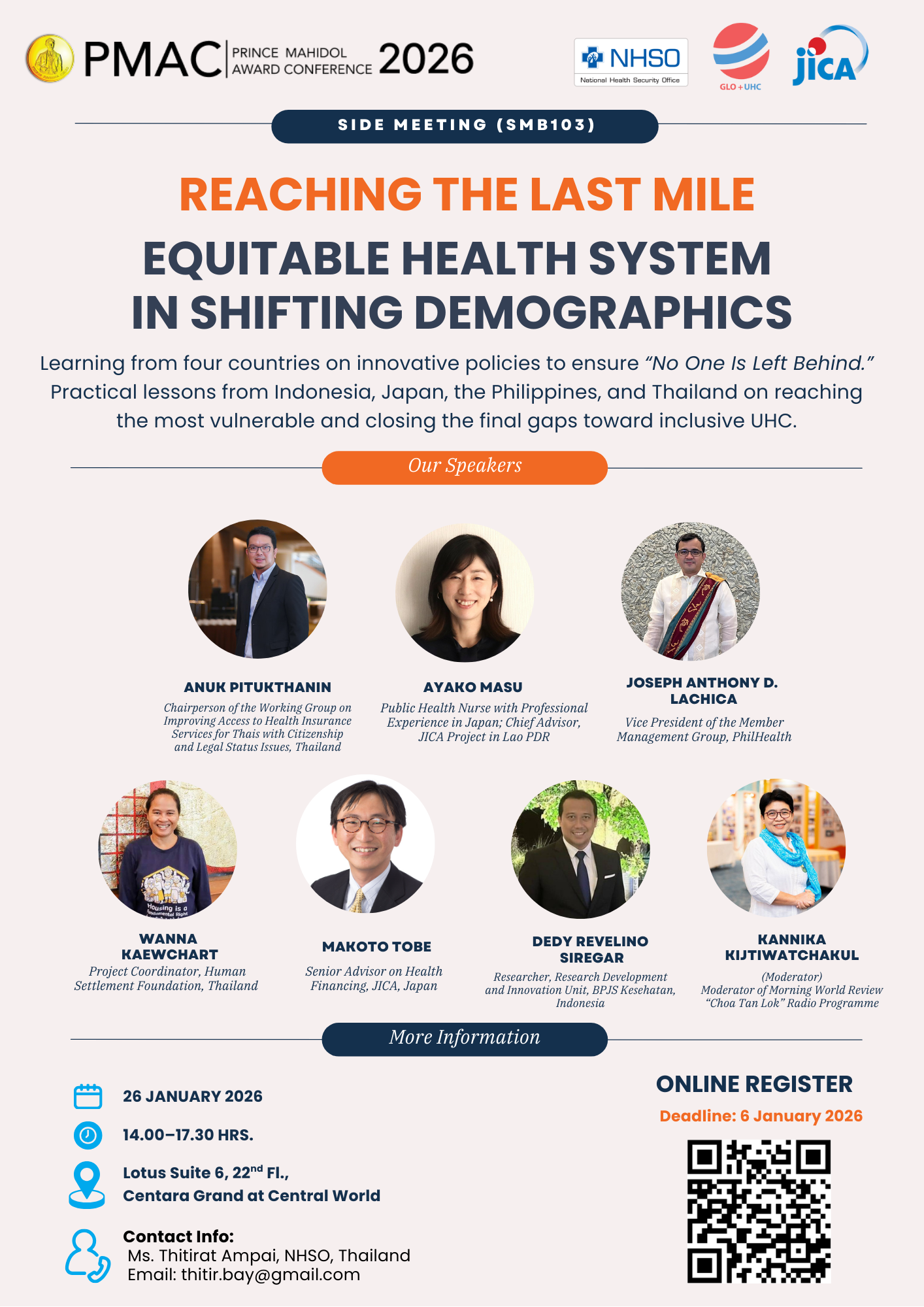Side Meetings
SMB103
Reaching the Last Mile: Equitable Health Systems in Shifting Demographics
26
Jan
- National Health Security Office (NHSO)
- Partnership Project for Global Health and UHC (GLO+UHC) Phase 3
- Japan International Cooperation Agency (JICA)

Global progress toward Universal Health Coverage (UHC) is slowing. In 2021, an estimated 4.5 billion people—over half the world’s population—were not adequately covered by essential health services, while 2 billion people experienced severe financial hardship from out-of-pocket health spending (WHO, 2024). Fragile and vulnerable groups—including displaced persons, stateless individuals, and urban and rural poor—remain disproportionately excluded from care.
The 2030 Agenda’s pledge to “leave no one behind” requires urgent attention to these last mile populations, who face structural and financial barriers that perpetuate health inequities. Achieving UHC demands deliberate, equity-centered strategies to include those most at risk of exclusion.
Thailand offers important lessons. Since 2002, three public insurance schemes—the Civil Servant Medical Benefit Scheme (CSMBS), Social Security Insurance (SHI), and the Universal Coverage Scheme (UCS)—have extended coverage to 99.73% of the population (NHSO Annual Report 2024). Yet about 0.27% remain outside the system, including stateless persons, unregistered beneficiaries, those requiring citizenship verification, individuals not residing at their registered address, and Thais living abroad. To address this, Thailand has implemented diverse measures: training community leaders and social workers, strengthening inter-agency collaboration, expanding digital and identity verification systems, proposing a special fund for stateless Thais, and extending services to Thai workers abroad through mobile and cross-border clinics. These efforts reflect Thailand’s commitment to equity, even at the most challenging “last mile.”
In Japan, the main challenge is not extending coverage but preventing the “effectively uninsured.” While nearly all residents are legally covered, some lose practical access to care due to premium arrears. Local governments mitigate this by offering premium adjustments and exemptions, ensuring that socially and economically vulnerable populations remain within the system.
The Philippines is advancing implementation of its 2019 Universal Health Care Act, which mandates automatic enrollment of all citizens, including Overseas Filipino Workers, into PhilHealth, the national health insurance program. This auto-registration and immediate eligibility system demonstrates strong commitment to equity by removing registration and payment barriers. Yet significant challenges remain in reaching the last mile: inadequate infrastructure, geographic isolation, fragile supply chains, and under-resourced primary healthcare networks. Strengthening primary care as the frontline of UHC and adopting a whole-of-society approach are central to bridging these gaps.
These real-world examples show how innovative, equity-centered approaches—tailored to demographic and socioeconomic contexts—can advance inclusive UHC even under demographic upheaval.
Aligned with the PMAC 2026 theme, Navigating Global Demographic Transitions through Innovative Policy: An Equity-Centered Approach, the Partnership Project for Global Health and UHC (GLO+UHC) Phase 3 and its partners are convening the side meeting Reaching the Last Mile: Equitable Health Systems in Shifting Demographics to share country experiences, foster multi-stakeholder dialogue on inclusive UHC, and generate actionable policy recommendations for life-course and demographic-sensitive health systems.
- Share country experiences in overcoming last-mile challenges with equity-focused innovations.
- Facilitate dialogue on scalable strategies to integrate marginalized populations into UHC.
- Develop actionable, equity-oriented policy recommendations responsive to demographic transitions.

